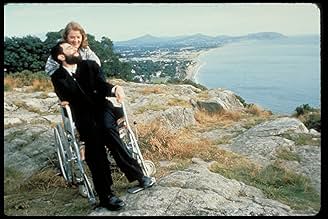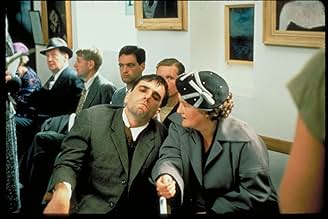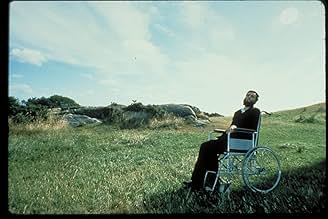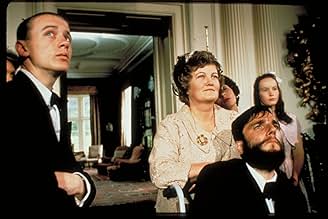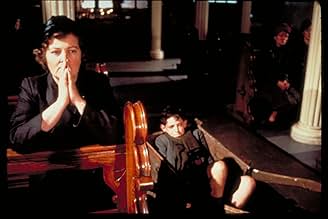Christy Brown, born with cerebral palsy, learns to paint and write with his only controllable limb - his left foot.Christy Brown, born with cerebral palsy, learns to paint and write with his only controllable limb - his left foot.Christy Brown, born with cerebral palsy, learns to paint and write with his only controllable limb - his left foot.
- Director
- Writers
- Stars
- Won 2 Oscars
- 23 wins & 20 nominations total
Pat Laffan
- Barman
- (as Patrick Laffan)
Owen Sharpe
- Young Tom
- (as Owen Sharp)
- Director
- Writers
- All cast & crew
- Production, box office & more at IMDbPro
Featured reviews
Notable for marking the commencement of Daniel Day-Lewis' personal version of method acting, My Left Foot presents the widely acclaimed actor pushing himself to the extreme in what is undoubtedly one of the proudest works of his acting career. And even though the film doesn't have anything else to offer, the performances are strong enough to keep the viewers engaged.
Based on the autobiography of the same name, My Left Foot tells the story of Christy Brown; an Irishman who was born with cerebral palsy but despite his handicap went on to become an artist & writer, all with the help of the only thing he could fully control: his left foot. The film covers his upbringing in a poor family, his daily struggles, discovery of new passions & also his stint with love.
Wonderfully directed by Jim Sheridan, the film is heartwarming & heartbreaking at the same time, and is an inspiring insight into the life of Christy Brown that makes the viewers go through various emotions, but pity isn't one of them. The technical aspects are finely executed & have nothing special going on but it's in the performances where the film manages to make the most lasting impression.
There are three key performances that are worth noting here. First is Daniel Day-Lewis who delves into his character like never before & plays him from inside-out. Next is Brenda Fricker who strongly chips in as Christy's mother. And last we have Hugh O'Connor who is as good as Day-Lewis for his portrayal of young Christy Brown sets up a perfect stage for Day-Lewis to take over.
On an overall scale, My Left Foot is a touching tale about the indomitable will of the human spirit to triumph against all odds, and succeeds mainly because of the unforgettable performances from its highly committed cast. But even if the film is entirely dependent on its acting strength, it still makes up for a rich cinematic experience that comes as a must for Daniel Day-Lewis' admirers as well as critics.
Based on the autobiography of the same name, My Left Foot tells the story of Christy Brown; an Irishman who was born with cerebral palsy but despite his handicap went on to become an artist & writer, all with the help of the only thing he could fully control: his left foot. The film covers his upbringing in a poor family, his daily struggles, discovery of new passions & also his stint with love.
Wonderfully directed by Jim Sheridan, the film is heartwarming & heartbreaking at the same time, and is an inspiring insight into the life of Christy Brown that makes the viewers go through various emotions, but pity isn't one of them. The technical aspects are finely executed & have nothing special going on but it's in the performances where the film manages to make the most lasting impression.
There are three key performances that are worth noting here. First is Daniel Day-Lewis who delves into his character like never before & plays him from inside-out. Next is Brenda Fricker who strongly chips in as Christy's mother. And last we have Hugh O'Connor who is as good as Day-Lewis for his portrayal of young Christy Brown sets up a perfect stage for Day-Lewis to take over.
On an overall scale, My Left Foot is a touching tale about the indomitable will of the human spirit to triumph against all odds, and succeeds mainly because of the unforgettable performances from its highly committed cast. But even if the film is entirely dependent on its acting strength, it still makes up for a rich cinematic experience that comes as a must for Daniel Day-Lewis' admirers as well as critics.
Christy Brown is born with cerebral palsy. His father (Ray McAnally) refuses to give him up and he learns to live with controlling only his left foot. His loving mother (Brenda Fricker) tirelessly raise him. As a child (Hugh O'Conor), everybody assumed that he's a simpleton until he wrote MOTHER with chalk. As a young man (Daniel Day-Lewis), he is rejected by the pretty girl. His father loses his job and becomes abusive. He falls for Dr. Cole (Fiona Shaw) treating his cerebral palsy but she's engaged. As an older man, he falls for his nurse Sheila (Alison Whelan).
It's a tough way to act for Daniel Day-Lewis. It's not just the physicality but he has to make sense despite his speech pattern. He has to be understandable without speaking understandable English. It's his anger and his unlikeability that brings out his humanity. He's not playing a saint or a caricature. It's a real person. It's an all-around performance.
It's a tough way to act for Daniel Day-Lewis. It's not just the physicality but he has to make sense despite his speech pattern. He has to be understandable without speaking understandable English. It's his anger and his unlikeability that brings out his humanity. He's not playing a saint or a caricature. It's a real person. It's an all-around performance.
After watching The Left Foot, I have came to the conclusion that Daniel-Day Lewis the greatest actor alive and perhaps the greatest actor ever! But for the film itself, it's a powerful film that's well directed, well-acted, masterfully written, and provokes a good amount of emotion. But most of all, it spreads awareness about this handicap. Cerebral Palsy is something people should know about this and while not a propaganda piece, this film does a good job on giving the audience information about this disorder.
Jim Sheridan's film tells the biography of a man named Christy Brown. Born with cerebral palsy, the story goes from his tough childhood to his even tougher adulthood where he becomes an expert writer and painter despite the fact he only has mobility with his left foot.
Now on to Daniel Day-Lewis. I think people would agree with me on where I stand with him as an actor. He puts every ounce of effort into his roles and he acts as if he is actually the character he is portraying. After his roles in "In the Name of the Father", "Lincoln", "Gangs of New York", and "There Will Be Blood," I can honestly say he is the best actor ever. Also, I must single out Brenda Fricker in this role as Christy's mother because she does such an amazing job.
Overall, My Left Foot is a wonderful film that tells a story of a condition that many people must suffer through. I am glad there is a film that brings proper awareness to the condition and hence, much emotion is provoked. On technical terms, this film not the best since I felt it could use just a little better editing. But story-wise, yes it is perfect. I rate this film 9/10.
Jim Sheridan's film tells the biography of a man named Christy Brown. Born with cerebral palsy, the story goes from his tough childhood to his even tougher adulthood where he becomes an expert writer and painter despite the fact he only has mobility with his left foot.
Now on to Daniel Day-Lewis. I think people would agree with me on where I stand with him as an actor. He puts every ounce of effort into his roles and he acts as if he is actually the character he is portraying. After his roles in "In the Name of the Father", "Lincoln", "Gangs of New York", and "There Will Be Blood," I can honestly say he is the best actor ever. Also, I must single out Brenda Fricker in this role as Christy's mother because she does such an amazing job.
Overall, My Left Foot is a wonderful film that tells a story of a condition that many people must suffer through. I am glad there is a film that brings proper awareness to the condition and hence, much emotion is provoked. On technical terms, this film not the best since I felt it could use just a little better editing. But story-wise, yes it is perfect. I rate this film 9/10.
A noted cinematic phenomenon of the late eighties and early nineties was the number of Oscars which went to actors playing characters who were either physically or mentally handicapped. The first was Marlee Matlin's award for "Children of a Lesser God" in 1986, and the next ten years were to see another "Best Actress" award (Holly Hunter for "The Piano" in 1994) and no fewer than five "Best Actor" awards (Dustin Hoffman in 1988 for "Rain Man", Daniel Day-Lewis in 1989 for "My Left Foot", Al Pacino in 1992 for "Scent of a Woman", Tom Hanks in 1994 for "Forrest Gump" and Geoffrey Rush in 1996 for "Shine") for portrayals of the disabled. Matlin, who played a deaf woman, is herself deaf, but all the others are able-bodied.
This phenomenon aroused some adverse comment at the time, with suggestions being made that these awards were given more for political correctness than for the quality of the acting. When Jodie Foster failed to win "Best Actress" for "Nell" in 1994 some people saw this as evidence of a backlash against this sort of portrayal. My view, however, is that the majority of these awards were well deserved. I thought the 1992 award should have gone to either Clint Eastwood or Robert Downey rather than Pacino, but apart from that the only one with which I disagreed would have been Hanks', and that was because I preferred Nigel Hawthorne's performance in "The Madness of King George". In that film, of course, Hawthorne played a character who was mentally ill.
"My Left Foot" was based upon the autobiography of the Irish writer and painter Christy Brown. Brown was born in 1931, one of the thirteen children of a working-class Dublin family. He was born with cerebral palsy and was at first wrongly thought to be mentally handicapped as well. He was for a long time incapable of deliberate movement or speech, but eventually discovered that he could control the movements of one part of his body, his left foot (hence the title). He learned to write and draw by holding a piece of chalk between his toes, and went on to become a painter and a published novelist and poet.
Life in working-class Dublin in the thirties and forties could be hard, and the city Jim Sheridan (himself a Dubliner) shows us here is in many ways a grim, grey, cheerless place, very different from our normal idea of the "Emerald Isle". (Sheridan and Day-Lewis were later to collaborate on another film with an Irish theme, "In the Name of the Father"). Against this, however, must be set the cheerfulness and spirit of its people, especially the Brown family. Much of Christy's success was due to the support he received from his parents, who refused to allow him to be institutionalised and always believed in the intelligence hidden beneath a crippled exterior, and from his siblings. We see how his brothers used to wheel him round in a specially-made cart and how they helped their bricklayer father to build Christy a room of his own in their back yard.
The film could easily have slid into sentimentality and ended up as just another heart-warming "triumph over adversity" movie. That it does not is due to a number of factors, principally the magnificent acting. In the course of his career, Day-Lewis has given a number of fine performances, but this, together with the recent "There Will Be Blood", is his best. He is never less than 100% convincing as Christie; his tortured, jerky movements and strained attempts at speech persuade us that we really are watching a disabled person, even though, intellectually, we are well aware that Day-Lewis is able-bodied. The other performances which stand out are from Fiona Shaw as his mentor Dr Eileen Cole, from Hugh O'Conor as the young Christy and from Brenda Fricker as Christy's mother (which won her the "Best Supporting Actress" award).
The other reason why the film escapes sentimentality is that it does not try to sentimentalise its main character. Christy Brown had a difficult life, but he could also be difficult to live with, and the film gives us a "warts and all" portrait. He was a heavy drinker, given to foul language and prone to outbursts of rage. He could also be selfish and manipulative of those around him, and the film shows us all these aspects of his character. Of course, it also shows us the positive aspects- his courage, his determination and his wicked sense of humour. Day-Lewis's acting is not just physically convincing, in that it persuades us to believe in his character's disability, but also emotionally and intellectually convincing, in that it brings out all these different facets of Christy's character. His Oscar was won in the teeth of some very strong opposition from the likes of Robin Williams and Kenneth Branagh, but it was well deserved. 8/10
This phenomenon aroused some adverse comment at the time, with suggestions being made that these awards were given more for political correctness than for the quality of the acting. When Jodie Foster failed to win "Best Actress" for "Nell" in 1994 some people saw this as evidence of a backlash against this sort of portrayal. My view, however, is that the majority of these awards were well deserved. I thought the 1992 award should have gone to either Clint Eastwood or Robert Downey rather than Pacino, but apart from that the only one with which I disagreed would have been Hanks', and that was because I preferred Nigel Hawthorne's performance in "The Madness of King George". In that film, of course, Hawthorne played a character who was mentally ill.
"My Left Foot" was based upon the autobiography of the Irish writer and painter Christy Brown. Brown was born in 1931, one of the thirteen children of a working-class Dublin family. He was born with cerebral palsy and was at first wrongly thought to be mentally handicapped as well. He was for a long time incapable of deliberate movement or speech, but eventually discovered that he could control the movements of one part of his body, his left foot (hence the title). He learned to write and draw by holding a piece of chalk between his toes, and went on to become a painter and a published novelist and poet.
Life in working-class Dublin in the thirties and forties could be hard, and the city Jim Sheridan (himself a Dubliner) shows us here is in many ways a grim, grey, cheerless place, very different from our normal idea of the "Emerald Isle". (Sheridan and Day-Lewis were later to collaborate on another film with an Irish theme, "In the Name of the Father"). Against this, however, must be set the cheerfulness and spirit of its people, especially the Brown family. Much of Christy's success was due to the support he received from his parents, who refused to allow him to be institutionalised and always believed in the intelligence hidden beneath a crippled exterior, and from his siblings. We see how his brothers used to wheel him round in a specially-made cart and how they helped their bricklayer father to build Christy a room of his own in their back yard.
The film could easily have slid into sentimentality and ended up as just another heart-warming "triumph over adversity" movie. That it does not is due to a number of factors, principally the magnificent acting. In the course of his career, Day-Lewis has given a number of fine performances, but this, together with the recent "There Will Be Blood", is his best. He is never less than 100% convincing as Christie; his tortured, jerky movements and strained attempts at speech persuade us that we really are watching a disabled person, even though, intellectually, we are well aware that Day-Lewis is able-bodied. The other performances which stand out are from Fiona Shaw as his mentor Dr Eileen Cole, from Hugh O'Conor as the young Christy and from Brenda Fricker as Christy's mother (which won her the "Best Supporting Actress" award).
The other reason why the film escapes sentimentality is that it does not try to sentimentalise its main character. Christy Brown had a difficult life, but he could also be difficult to live with, and the film gives us a "warts and all" portrait. He was a heavy drinker, given to foul language and prone to outbursts of rage. He could also be selfish and manipulative of those around him, and the film shows us all these aspects of his character. Of course, it also shows us the positive aspects- his courage, his determination and his wicked sense of humour. Day-Lewis's acting is not just physically convincing, in that it persuades us to believe in his character's disability, but also emotionally and intellectually convincing, in that it brings out all these different facets of Christy's character. His Oscar was won in the teeth of some very strong opposition from the likes of Robin Williams and Kenneth Branagh, but it was well deserved. 8/10
Daniel Day Lewis is one of the best actors of our time and one of my favorites. It is amazing how much he throws himself in each of the characters he plays making them real.
I remember, many years ago, we had a party in our house - the friends came over, we were sitting around the table, eating, drinking the wine, talking, laughing - having a good time. The TV was on - there was a movie which we did not pay much attention to. Then, suddenly, all of us stopped talking and laughing. The glasses did not clink, the forks did not move, the food was getting cold on the plates. We could not take our eyes off the screen where the young crippled man whose entire body was against him and who only had a control over his left foot, picked up a piece of chalk with his foot and for what seemed the eternity tried to write just one word on the floor. When he finished writing that one word, we all knew that we had witnessed not one but three triumphs - the triumph of a human will and spirit, the triumph of the cinema which was able to capture the moment like this on the film, and the triumph of an actor who did not act but who became his character.
Jim Sheridan's "My Left Foot" is an riveting, unsentimental bio-drama about Christy Brown, the man who was born with cerebral palsy in a Dublin slum; who became an artist and a writer and who found a love of his life.
I like every one of Day Lewis's performances (I have mixed feelings about his performance in GONY) but I believe that his greatest role was Christy Brown in "My Left Foot"
I remember, many years ago, we had a party in our house - the friends came over, we were sitting around the table, eating, drinking the wine, talking, laughing - having a good time. The TV was on - there was a movie which we did not pay much attention to. Then, suddenly, all of us stopped talking and laughing. The glasses did not clink, the forks did not move, the food was getting cold on the plates. We could not take our eyes off the screen where the young crippled man whose entire body was against him and who only had a control over his left foot, picked up a piece of chalk with his foot and for what seemed the eternity tried to write just one word on the floor. When he finished writing that one word, we all knew that we had witnessed not one but three triumphs - the triumph of a human will and spirit, the triumph of the cinema which was able to capture the moment like this on the film, and the triumph of an actor who did not act but who became his character.
Jim Sheridan's "My Left Foot" is an riveting, unsentimental bio-drama about Christy Brown, the man who was born with cerebral palsy in a Dublin slum; who became an artist and a writer and who found a love of his life.
I like every one of Day Lewis's performances (I have mixed feelings about his performance in GONY) but I believe that his greatest role was Christy Brown in "My Left Foot"
Did you know
- TriviaAccording to the "Making of My Left Foot" segment on the Special Edition DVD, Sir Daniel Day-Lewis broke two ribs during filming from assuming the hunched-over position in his wheelchair for weeks of filming. He also would refuse to come out of character. On visits to the set canteen, other people would have to help him with food. On one visit from his English agent, Day-Lewis again refused to come out of character as Christy Brown, and his frustrated agent took off.
- GoofsIn the beginning of the movie, when Mary Carr gets Christy Brown into the library, the shadow of the boom mic can clearly be seen on a white door.
- Quotes
Christy Brown: I've had nothing but Platonic love all me life. Do you know what I say? FUCK PLATO! And fuck all love that's not a hundred percent commitment!
- SoundtracksFoggy Dew
(uncredited)
Traditional
- How long is My Left Foot?Powered by Alexa
Details
- Release date
- Countries of origin
- Official sites
- Language
- Also known as
- Mi pie izquierdo: la historia de Christy Brown
- Filming locations
- Production companies
- See more company credits at IMDbPro
Box office
- Budget
- £600,000 (estimated)
- Gross US & Canada
- $14,743,391
- Opening weekend US & Canada
- $41,165
- Nov 12, 1989
- Gross worldwide
- $14,743,391
Contribute to this page
Suggest an edit or add missing content




